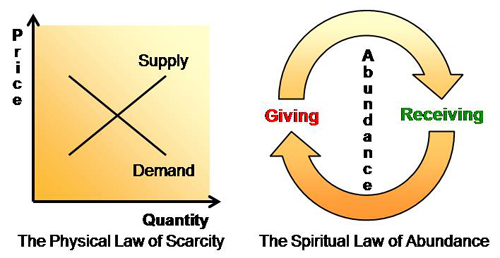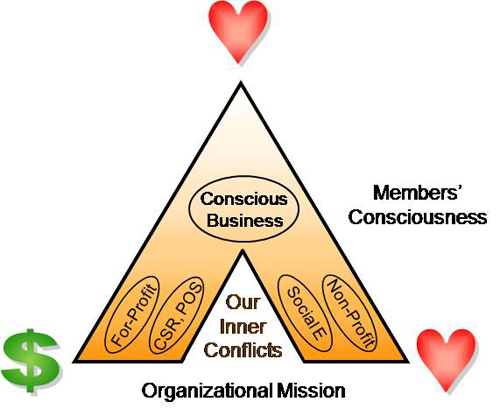
In last week's column, we talked about how capitalism's great strength is its capacity for economic expansion, and its great challenge is its addiction to economic expansion. We looked at the problems that come with unconscious capitalism, and the need for us to develop a new form of capitalism that is both sustainable and conscious.
So what does it mean to practice conscious capitalism?
One of the highest spiritual laws on our planet is the law of abundance, also known as the law of giving and receiving. As defined by Deepak Chopra, "The universe operates through dynamic exchange...giving and receiving are different aspects of the flow of energy in the universe. And in our willingness to give that which we seek, we keep the abundance of the universe circulating in our lives."
What is the difference between a lush tropic island and the Dead Sea? The island circulates water, both giving and receiving it. The Dead Sea doesn't - it only receives.

The spiritual law of abundance is as automatic and consistent as the physical law of gravity, and abundance only breaks down when we stop the flow. When we become attached to things, we stop giving, we stop the flow - and we suffer. When we judge ourselves as unworthy, we stop receiving, we stop the flow - and we suffer.
One of the keys to conscious capitalism is a commitment to providing exceptional value, which means being equally committed to giving exceptional value and to receiving payment for that value. It means being committed to practicing the spiritual law of abundance.
When we open to spiritual reality, our experience is one of abundance. In contrast, modern economic theory is based on scarcity. One of the definitions of economics is "the social science of choice under scarcity." With this comes fear, denial, greed and addiction. There's a reason why economics is called the dismal science.
This does not mean that economics is wrong. What it means is that the world changes as we lift in consciousness. At the physical level, the world looks like it's based in scarcity, win/lose, either/or, and survival of the fittest. But as we're able to see things from a higher perspective, we realize that things are based in abundance, win/win, both/and, and love.
The challenge is that when we start to see this, we naturally tend to go into spiritual bypass, where we only want to focus on the spiritual and we tend to deny the physical (which is just another form of either/or). We may shift from the receiving-only focus of unconscious for-profit organizations ("money, money, I want more money NOW") to the giving-only focus of unconscious non-profit organizations ("there shouldn't be any scarcity so I'm going to fix things by sacrificing my well being for others").
We may sit around and think that if we just watch The Secret another 27 times, we'll win the Lotto and live happily ever after. We may see our self worth as defined by how much we sacrifice ourselves for others. Or we may feel a secret sense of entitlement, where we expect that if we become good enough at providing our products and services, we deserve to have our clients beat a path to our door.
So how do we embrace both the law of scarcity and the law of abundance?
That is a multi-trillion dollar question our world is grappling with right now.
I believe the answer starts by recognizing how deep this conflict goes within each of us and within our organizations, and by learning to embrace this.
To one aspect of ourselves, money is like oxygen. To our basic, most physical self, business often feels like a battle for survival. When we enter into a sales discussion, our animal brain often starts wondering who's going to be able to eat today - us or them?
Yet business success requires us to be of service to our customers, and service is one of the highest forms of consciousness on the planet. Our desire to serve is one of the purest forms of love. It connects directly into our higher self - our most spiritual, most conscious aspect. As another way of putting it, while money connects to our lowest chakras, service connects to our highest ones.
Here's the thing. When we seek to do both business and spirituality at the same time, any inner conflicts we have between our basic self and our higher self naturally come up for healing. The more committed we are to doing both sales and service, or to doing business in a way that creates both money and meaning, the more these conflicts naturally come forward.
We all have a challenge integrating money and meaning, and it shows up in our lives and in society. Notice how we have two types of organizations, for-profit companies that focus primarily on money and non-profits that focus primarily on service. Relatively few groups do both at the same time, because conscious business requires learning how to embrace and heal the conflicts inside ourselves.
In other words, conscious business starts by recognizing that it can't be measured just by the mission of the organization. It also requires focusing on the consciousness of the members in the organization. In other words, it's not enough to focus just on what we do, it also requires focusing on how we are as we do it.

Most of the work in this area I've seen so far has tended to come from one of two angles.
1)For-profit organizations seeking to make their mission more loving. This includes corporate social responsibility, the triple bottom line, etc.
2)Non-profit organizations seeking to make their mission more self-sustaining. This includes social enterprise, social entrepreneurship, venture philanthropy, etc.
But the thing is, when we're coming from a lower place in consciousness, business is a battle for survival, and service is a sacrifice. When we're at the bottom of the pyramid, we do have to choose between the left and the right, between for-profit and non-profit, between giving and receiving. It's only as we lift in consciousness (a large piece of which happens by integrating the conflicts inside ourselves and by learning to love all of who we are) that we're able to actually live the law of abundance.
Because of this, you can't build a conscious organization without also focusing on the consciousness of its members'.
When our conscious self is identified with our physical self, economics is about scarcity and service is about sacrifice. This is shown at the bottom of the triangle, and it's what happens when we listen to the news and go into fear.
When our conscious self is identified with our spiritual self, both economics and service are about abundance and love. This is shown at the top of the triangle, and it's what happens when we learn to see everything in life, including our inner conflicts, as opportunities for learning, upliftment and growth. It's what happens as we find our inner conflicts, and instead of trying to fight, feed or flee them, we learn to love them instead.
To learn more about this topic, please feel free to visit ecoaching.corecoaching.org and www.sellingbygiving.net.